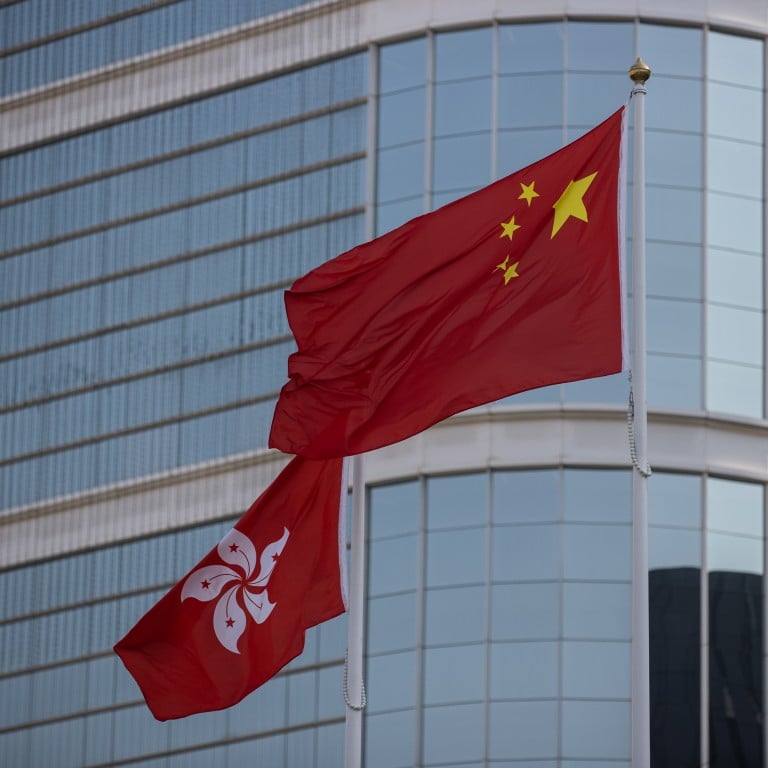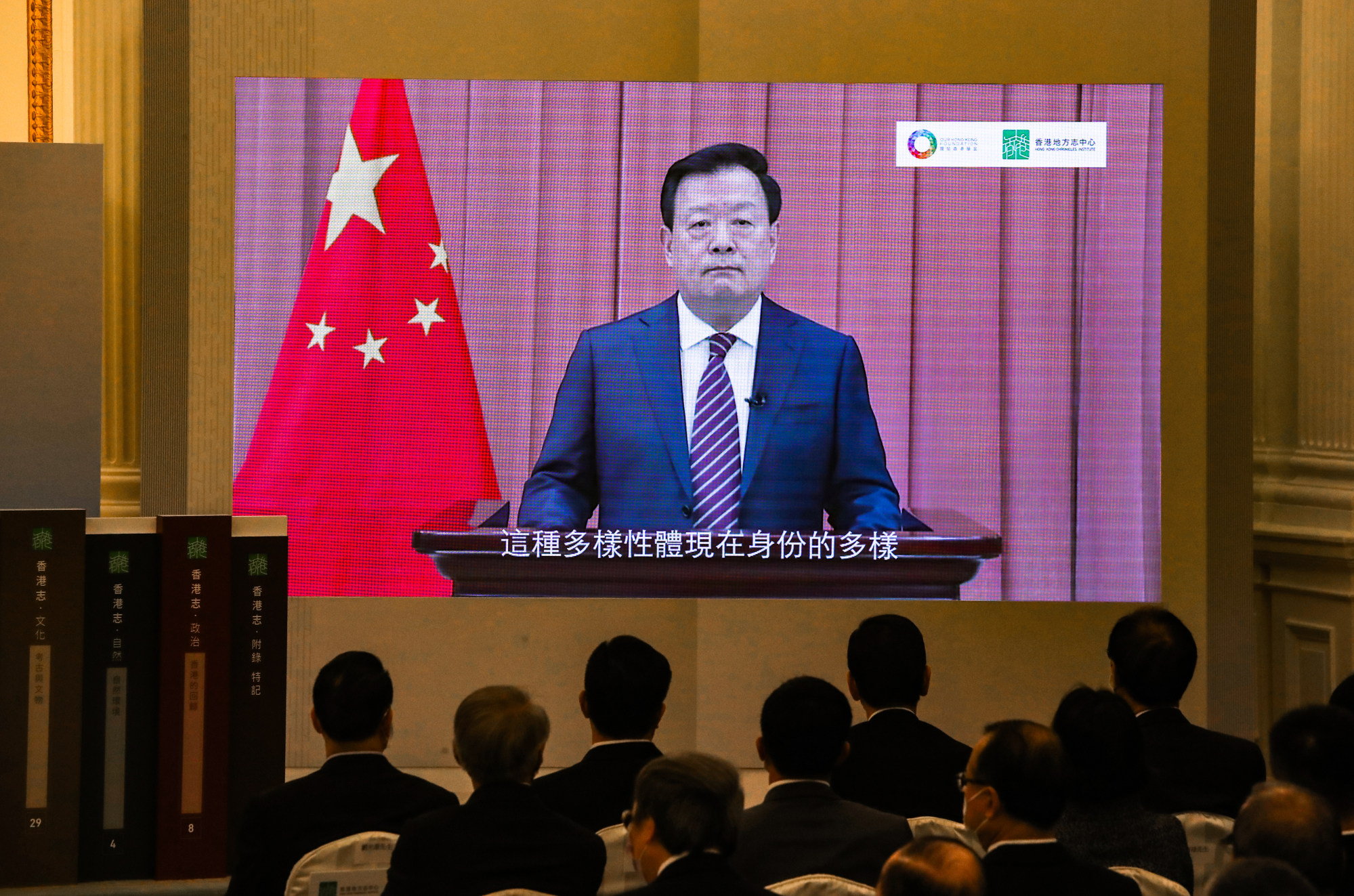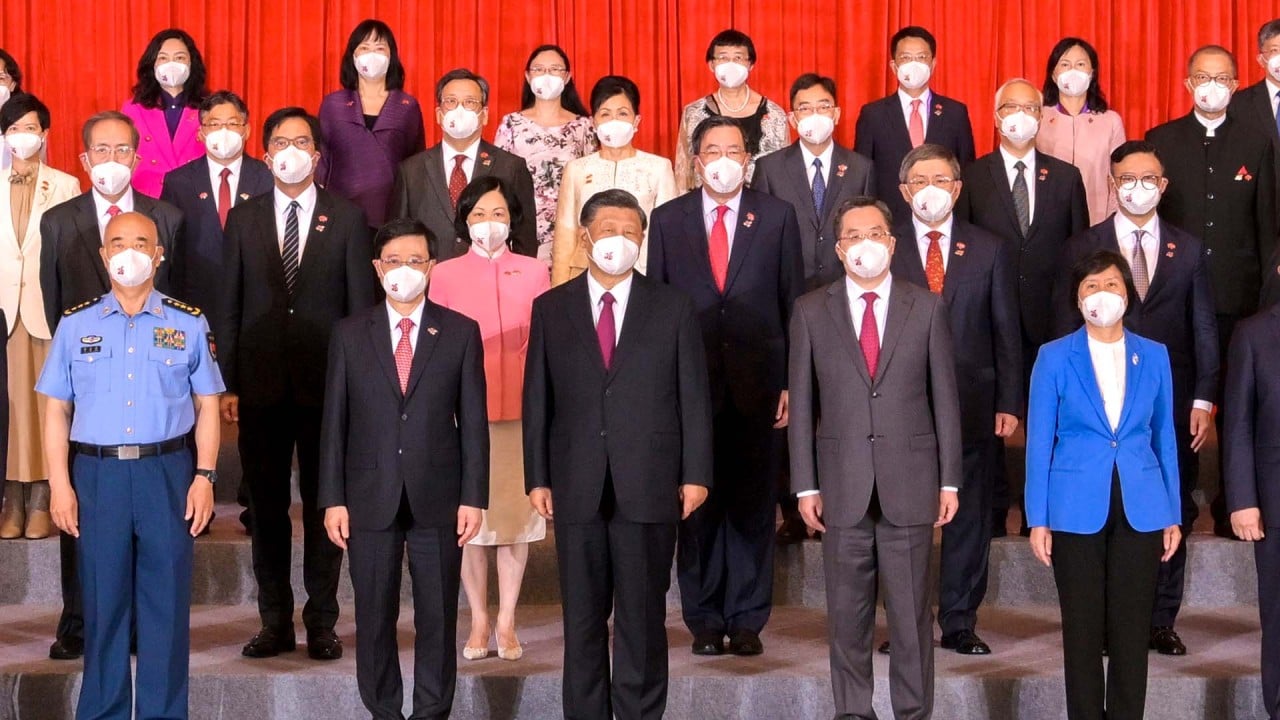
What is behind proposed move for Beijing’s key office on Hong Kong and Macau affairs to report directly to China’s top Communist Party leadership?
- Session in Beijing approves changing reporting line of Hong Kong and Macau Affairs Office from State Council to party’s Central Committee, sources say
- Move seen as underscoring city’s importance while also strengthening party’s oversight role and clarifying chain of command between HKMAO and liaison office
Beijing’s top office overseeing Hong Kong affairs is expected to be elevated to a unit answering directly to the leadership body of the ruling Chinese Communist Party, a move seen to be underscoring the city’s importance while also strengthening the party’s oversight role, the Post has learned.
Insiders said the impending change to the reporting line of the ministerial-level Hong Kong and Macau Affairs Office (HKMAO) – from an administrative agency of the State Council to the party’s Central Committee – was approved during the political body’s second plenary session on Tuesday as part of the “Party and State Institutional Reform Plan”.
The plan will be submitted to China’s top legislative body, the National People’s Congress (NPC), which begins its annual session on Sunday, and will take effect after being endorsed when the country’s two key annual political gatherings, also known as lianghui, conclude later this month.

Once adopted, the move will underscore how Hong Kong affairs remain a key focus for the central government while at the same time clarifying the chain of command between HKMAO and Beijing’s liaison office in the city, which acts as a bridge to the mainland authorities, according to sources.
Two mainland insiders familiar with the proposal told the Post the change might involve adding the official title of “The Hong Kong and Macau Work Office of the Central Committee of the Communist Party of China” to the existing State Council’s Hong Kong and Macau Affairs Office.
It would be a de facto promotion of the office’s status as most decision-making power rests in the hands of the party organs, with President Xi Jinping at the core as its general secretary.
“The new title indicates that the office will officially be an agency under direct management of the party’s Central Committee going forward,” one source based in Beijing said.
Meet the men in line to head Beijing’s oversight of Hong Kong and Macau
“Being an agency directly under supervision of party central carries significant political weight. Since 2018, the party has ordered all its members to follow ‘The Two Upholds’, referring to upholding Xi’s core position on the party’s Central Committee, and upholding party Central Committee’s authority,” he added.
The HKMAO, led by Xia Baolong, is the secretariat office of the powerful Central Leading Group on Hong Kong and Macau Affairs – the party’s top body in charge of the special administrative regions’ affairs which directly reports to the party’s Politburo.
Under the leadership of Executive Vice-Premier Han Zheng, the group was upgraded from a Central Coordination Group in 2020 following the anti-government protests in the financial hub. Analysts said his successor would be made clear during the “two sessions”. Wang Huning and Ding Xuexiang, both Politburo Standing Committee members, are said to be in the running.
“This move will sort out the relationships between the three offices, as it is clear that the HKMAO is serving the leading group, while the Hong Kong and Macau liaison offices are the local outposts to execute the group’s decisions and listening posts to solicit local opinions,” the insider said.
Beijing’s targets for Hong Kong point to urgency, jurisdiction over city: analysts
Also confirming this impending change, a second source said Beijing had folded the HKMAO into the State Council structure upon Hong Kong’s return to Chinese rule in 1997 as “it did not want to be seen as too hands-on on Hong Kong and Macau, basically leaving it to largely a central government and SAR government relationship, so as to uphold the principle of ‘one Country, two systems’ and Hong Kong people administering Hong Kong”.
“But things are different in Xi’s new era. While the party’s overall leadership is stressed on the mainland and Hong Kong is going to be governed by patriots, the party sees no need to continue to stay backstage.”
The Official Xinhua News Agency confirmed the party’s approval of the draft restructuring plan at Tuesday’s session where Xi presented a work report, but the report did not give any details.
“Efforts are needed to deepen institutional reform in key areas and ensure that the party’s leadership over socialist modernisation becomes more refined in institutional set-up,” the session noted, according to Xinhua.
Observers also suggested the move was seen as a sign that Beijing remained concerned that despite Hong Kong’s political overhaul to ensure “patriots” ruled the city, the city could be caught in a vulnerable spot amid escalating tensions with the United States.
Lau Siu-kai, a consultant at the semi-official Chinese Association of Hong Kong and Macau Studies think tank, agreed the likely elevation of the office was to partly address this concern.
“This move could allow the state leaders to swiftly mobilise both ministerial-level and party-level resources in facilitating work relating to Hong Kong in critical times,” he said.
High-level Hong Kong, Beijing officials discuss district councils’ future
Lau added the planned change was comparable to the 2018 reform of the ministerial-level State Administration for Religious Affairs that placed it under the direct rule of the United Front Work Department, an organ of the Central Committee.
The structural change at that time drew mixed views, with some critics seeing it a move to suppress religious freedom. But Lau said it had been proved as an efficient way to maintain stability by centralising power.
But the HKMAO reform should not be compared to one involving China’s ministerial-level Taiwan Affairs Office, which he said adopted another name as the Taiwan Affairs Office of the Central Committee of the Chinese Communist Party, he said.
That change was for the purposes of communicating with Taiwanese officials on a party-to-party basis, given Beijing did not recognise the island’s government, he added.
National security chief in Hong Kong takes reins at liaison office
Leung Che-cheung, a Hong Kong member of the Chinese People’s Political Consultative Conference, the country’s top political advisory body, said the HKMAO reform was aimed at making the reporting mechanism more efficient.
“The two agencies often solicit views from us and various stakeholders on similar issues relating to Hong Kong,” he said. “A restructuring might clarify their division of labour as well.”
He brushed off concerns that the impending change could give an impression that the one country, two systems principle that had governed ties between Beijing and Hong Kong since the handover would be undermined after the office was placed under direct control of the party’s leadership.
He noted Beijing’s comprehensive jurisdiction over Hong Kong was highlighted in a white paper issued by the State Council in 2014.



